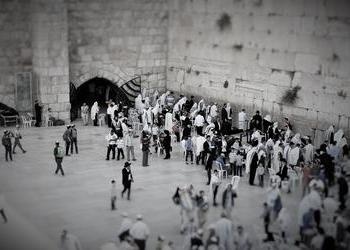Vertical News
Synagogue Attack in Jerusalem, Lessons of Personal Responsibility

Yesterday’s attack, in which four Jewish worshipers and one Druze policeman were killed by two Arab men (who were themselves killed by policemen), at the Kehillat Bnai Torah synagogue in the Har Nof neighborhood of Jerusalem is the latest in a long series of violent acts that have rocked Israel and the rest of the Middle East since early summer. Though the synagogue is once again open to worshipers, this tragedy stokes the fire of conflict in Israel.
The two assailants were motivated to carry out religious terrorism and carried knives, guns, and cleavers which they used in the attack. They were twenty-one and twenty-seven years old, one married and a father. The worshipers killed were all the heads of large families (Tova Dvorin, “Five Killed in Terror Attack at Jerusalem Synagogue,” Arutz Sheva 7 at IsraelNationalNews.com, November 18, 2014 and Peter Enav, “A Look at Victims, Assailants in Jerusalem Attack,” My Way News at APNews.MyWay.com, November 18, 2014).
Families suffer under this kind of terrorism. Violence like this deprives people of their future in this life and causes trauma to the family members who cared about them. God’s Kingdom will be the product of millions of human families producing future God-beings who will ultimately populate God’s family. Satan the devil seeks to damage, cut short or destroy the development of those families through whatever means possible.
Do our choices matter?
We desire to see God’s Kingdom wipe away the tears brought on by such violence, but as young people seeking to follow the true God of the Bible can we learn anything else from the terrorist attacks in the Middle East? What about prophecy? Or lessons of personal conduct?
Prophecy is a vital means of anticipating world events. After all, God knows the hearts of all nations and individuals. But looking closely, we find that those carrying out these attacks are primarily young men. And although young adults or teens are the perpetrators, they are also the victims of this conflict.
Is there a lesson for us? Aren’t we responsible for our own actions? Or are we excused from personal responsibility simply because we are a part of a larger cause?
Our role as future leaders in this age, and in the age to come, depends on how we conduct ourselves now. Our way of life is the very opposite of the violence exemplified by terrorism, and God expects us to set the example of His way of life to others. And those “others” may in fact be called to God’s truth in this life. What kind of hope do we give them by our behavior? Are we reliable, dependable, responsible, kind and gracious, but firm in our resolve to obey God before men (see Acts 5:29)? Is our language, choice of entertainment, ability to commit to relationships with God and with others a sound example or do we reflect the worst things about the society around us?
The words of the prophet Jeremiah should motivate our resolve to take responsibility for God’s truth as young people, “For I know the thoughts that I think toward you, says the LORD, thoughts of peace and not of evil, to give you a future and a hope” (Jeremiah 29:11, NKJV). God has plans for us, as He has for all generations before and after us. Are we focused on that Kingdom and ready to enthusiastically live a positive example?
